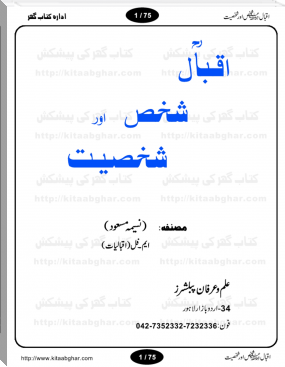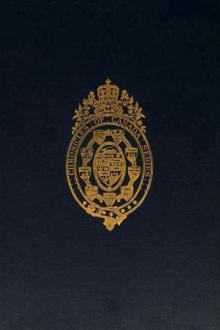The Philippine Islands, 1493-1898 by - (read any book TXT) 📕

- Author: -
- Performer: -
Book online «The Philippine Islands, 1493-1898 by - (read any book TXT) 📕». Author -
112. Although from the letter that I am writing to the viceroy of Mexico one can understand something of what concerns religious instruction and the friars in this country, still I state the matter here as I understand it. Although, according to their rule, they may hold property in common, they cannot do so here; for the houses are built of wood and bamboo, while there are no other holdings for them. To all friars, priests, and lay brethren something must be given, so they are each granted an annual income of one hundred pesos, and one hundred fanégas of rice. I think there is a lack of religious instruction here; for there are only thirteen friars who can say mass, and I am not sure that any one of these understands the language of the natives. I am told that these islands alone require one thousand priests. Those friars who are to come here must be men who are missed elsewhere, since they come to lead an apostolic life. It is very necessary for your Majesty to send friars from all the orders—especially the Franciscans, and many of them, for they live among the Indians, and we need not support them. Your Majesty's only expense, so far as they are concerned, will be certain articles for their vestments, from Nueva España. I entreat your Majesty to provide for this most carefully, for it is necessary.
113. When I arrived, there were two ecclesiastics, one of whom died of disease, and one only is left. Many are needed. The ecclesiastics complain of the friars sent them. During my term all will be peace.
114. There is a decree of concession in these islands, issued by your Majesty, to the effect that for ten years your Majesty's fifth of the gold should be made one-tenth. [11] The city claims that this concession is continued. As all are soldiers and are poor, it is necessary and just that your Majesty concede this in this instance. Likewise there is exemption for thirty years from customs. This amounts to a mere pittance here, and what is brought hither or carried away belongs to the soldiers, who support themselves with this help; for they are given nothing, except a few encomiendas to some, and rations to others who are poor and sick; and these customs duties should be allowed to all, to prevent them from begging.
115. Up to the present time there have been no duties on exports or imports, or any other duties. And as I came during so hard times, and the people were so poor and few I did not dare to impose them. It seems to me too soon to talk of duties until it can be made profitable. This amounts to but a small sum, and whatever is brought from China by the vessels is but a small matter; and if we did not treat them well, they would not return. Deprived of what they bring, we would suffer. Therefore I mean to defer this until we have some galleys fitted up, and possess a firmer grip in this country,
116. In this island the natives have a quantity of gold, in the form of jewelry, with which they trade. There are many reports of gold mines. Because it is reported that the best mines are those in the province of Ylocos, I sent thither the sergeant-major from this camp with forty arquebusiers. He reached those mines, and reports that they are located in a very rough country, twenty leagues inland; that the way thither is obstructed by great forests; and that the country is very cold, and has great pine forests. He brought some metal, all of which I am sending to the viceroy of Mexico; this appears to be worth something. As it is necessary to march afoot and to carry their food, and the country is hostile, and the soldiers poor, it seems a pity to send them to lose what they have, in a district where they can obtain no profit; for the operation of the mines requires tranquillity among the people, the service of many men, and abundant supplies. I shall endeavor to have the troops return, when food can be taken there, and will inform your Majesty thereof.
117. When the sergeant-major was returning from the mines, he discovered on an islet the two friars who were going with the captains in May. They say that the captains attempted to rob them; but, upon seeing that they had neither gold nor silver, because all the alms that had been given them had been deposited, by my advice, in a place of safety, the captains said that they would not take them to China since they were not taking thither anything for presents. A Chinese who was going with them as interpreter was also robbed of what I had given him. They beheaded two other Chinese who had been with Limahon, and were presented to the friars, so that they could not, on returning to their own country, relate what had occurred. It is said that the captains had determined to circulate there in China the story that Limahon and the master-of-camp had both been killed in the fight, whereupon the Castilians being without a leader, returned to Manila and allowed the corsairs opportunity to escape. But the latter remained, in order to verify the axiom that they have in China, that they may not flee. This is so evil a race that if today the whole world were given them, tomorrow they would commit a thousand treasons to steal one single real. We shall live here always on our guard, and shall do our duty, God helping.
118. As I have informed your Majesty, the master-of-camp, Martin de Goite, died; and after his death, Guido de Lavesares appointed Captain Juan de Saucedo as master-of-camp. This captain assisted in the expedition against the corsair, and it was under his charge in Pangasinan. At my arrival I did not discuss with him and the captains the matter of residencia, for they were artful enough, and at variance with one another. Moreover it was rather the moment for burying troubles and proceeding to business. Therefore neither in his office nor in that of the captains appointed (in greater number than was necessary) by Guido de Lavesares, did I make, nor have I made, any innovation; for there are so few people here. Juan de Saucedo, master-of-camp, went to Ylocos to collect tribute from some Indians of an encomienda that he had there. There he had an attack of illness, from which he died in a short time. This is the sickness that kills old and young. Upon this occasion of the death of the master-of-camp the Chinese fabricated their lie, and complained that we did not give them anything; while in reality we spent a considerable sum from your Majesty's royal exchequer to supply them with provisions, ship's stores, and other articles, in order that they might take the fathers to China. I believe that God wills it thus, and that it is well that they owe something, so that they may pay it at once. It is not safe to go unarmed or carelessly in that country, or in this; nor must one begin an attack without having a fort to receive the return blow, and be able to sustain it. I refer to what I have said above, and I beseech your Majesty once more to have this expedition undertaken. As I before remarked, two merchant-ships remained here, and we treated them kindly and with justice. When they were leaving, they asked me what message I had for their country. I told them to convey my compliments to the said captains, and to say that I had very kind feelings for all the people of China; and that this was my message.
119. Since this letter was written, we have received word that the ship sent by the viceroy this year with the usual help was lost. It was the pilot's fault, or at least they say that it was. May God find a remedy for this loss, for I dare not speak of it.
120. With this I enclose a copy of the letter that I have written to the viceroy. With it I send a list of all that is needed here. This ship sets sail at a favorable season, the beginning of June of 76; and, please God, another will leave in about a month, as it lacks but a little carpenter-work. We have been working at it five months.
121. In the investigation and accounts, the officials excused themselves, saying that they had no instructions; so I made a few ordinances adapted to the life here. I am sending these with the present letter.
122. I am sending also the investigations that were made in regard to no ship leaving last year; and about not compelling any one to assay gold that is mined and traded with here.
123. I am sending the originals, and translations of the letters from China, together with the residencias; and other papers, consisting of a Chinese map and another small map that I had made here, some stories of China, and those that they call "Flowers of Silver"—all in a box directed to the viceroy of Nueva España, so that it may be sent to your Majesty. It may be, as I believe, that, in the accounts of the officials of your Majesty's royal treasury, I also have not fulfilled well the duty of accountant, as is done at court. I humbly beg your Majesty that these faults may be pardoned, and that I may be advised of them, so that in the future my work may be more correct. When these ships are despatched, I shall begin to examine the accounts of last year, and shall send them by the first ship. I shall set down fully in these your Majesty's actual income here. I do not venture to send it with the other papers but will send it by itself. The only data accompanying this letter are in a statement of the money paid into the treasury last year, 1575; and I hope, God helping, that this amount will soon increase.
124. Because, as I have said, this year's ship from Nueva España was lost, will your Majesty please order new copies of all the papers sent in it.
125. Your Majesty sent me twelve magistracy titles for the regidores of this city, with a decree. I gave them to those magistrates whom I found living here, who numbered five, seven having died before my arrival, counting one who had become a friar. Therefore I guided myself by the precedent that there should be twelve. In addition to these five, there are the three officials of this royal exchequer, which makes the number eight; a high-constable of the city, who was already provided, and him I have left undisturbed; one Antonio Alvarez, one Franciso Bañon,





Comments (0)